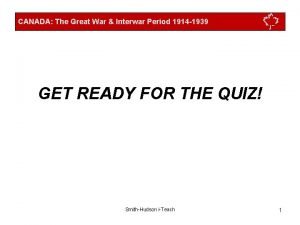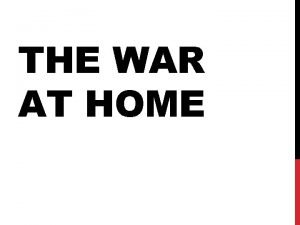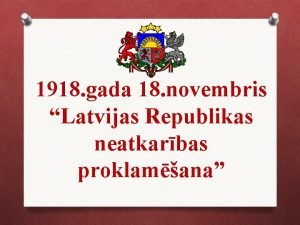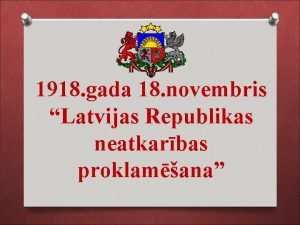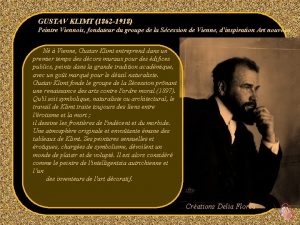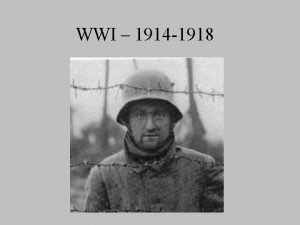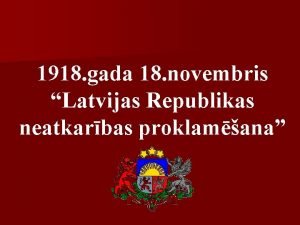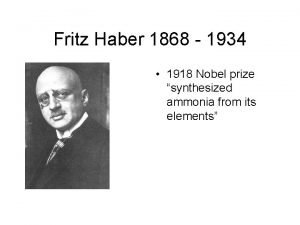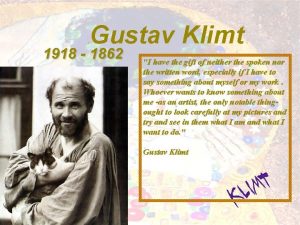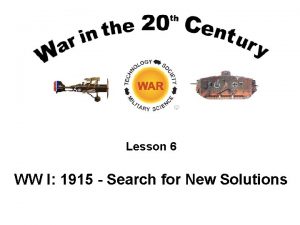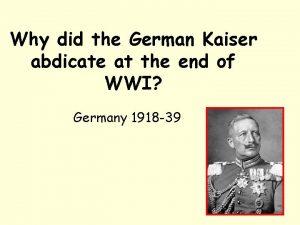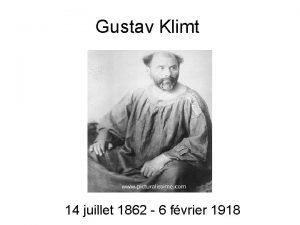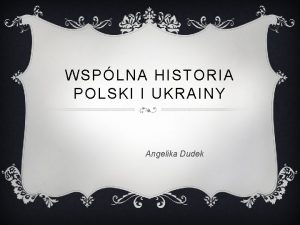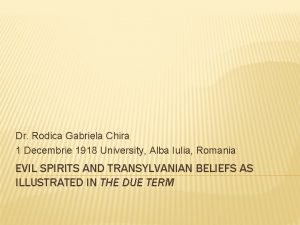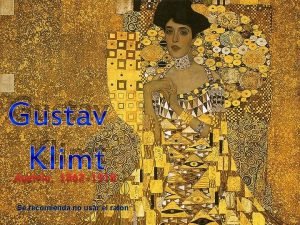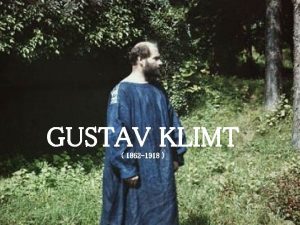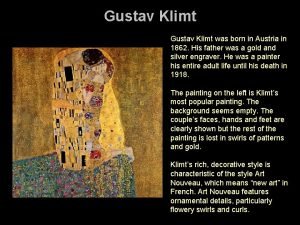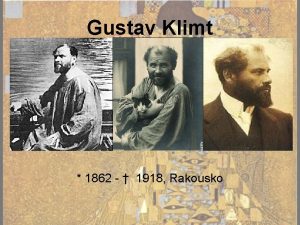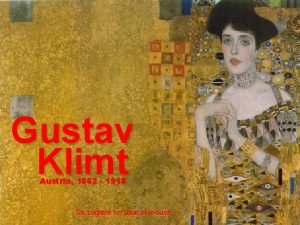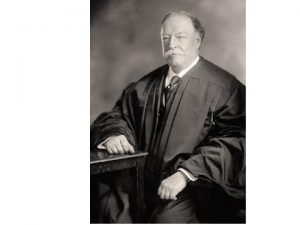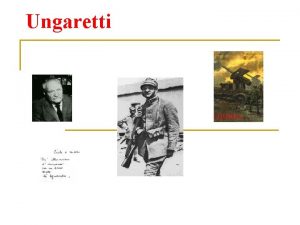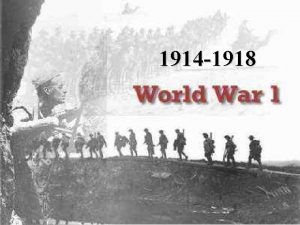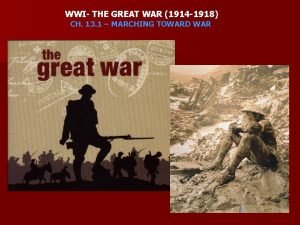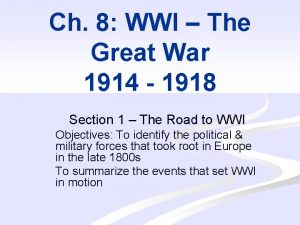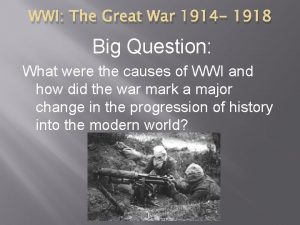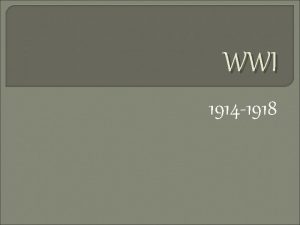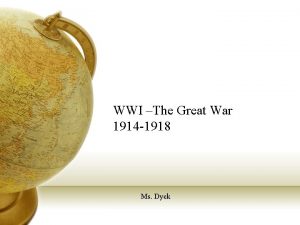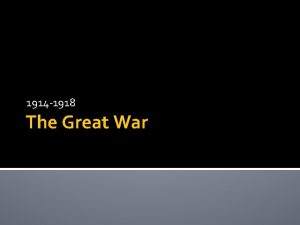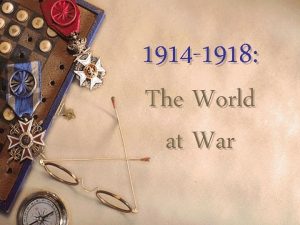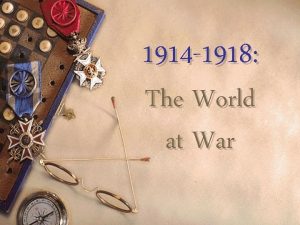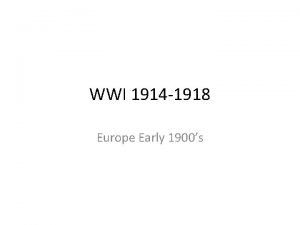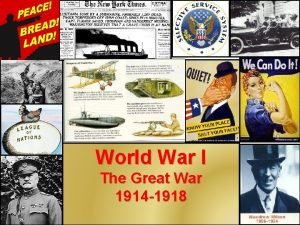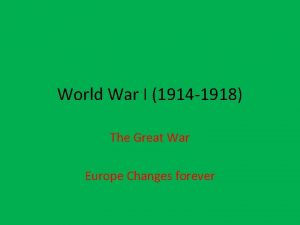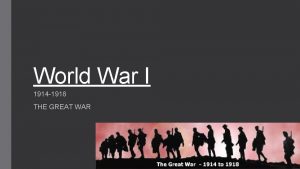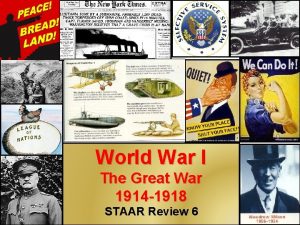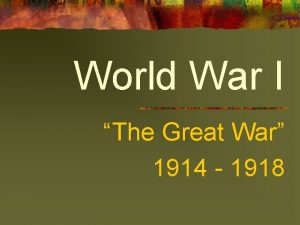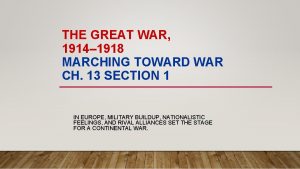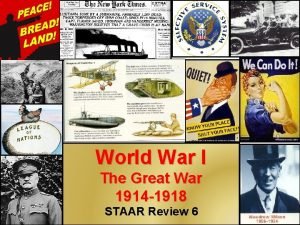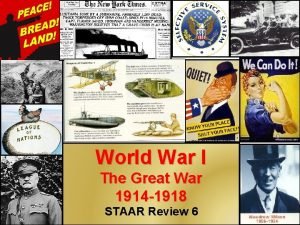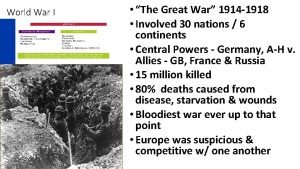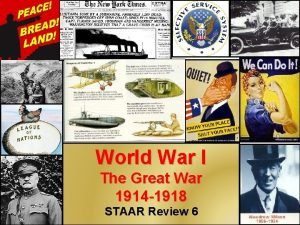The Great War WWI 1914 1918 The Pursuit


























- Slides: 26

The Great War WWI 1914 -1918

The Pursuit of Peace • Europe had a long history of warfare and by the 1900’s many in Europe took steps to create a everlasting peace. The following were efforts to try and prevent war in Europe: • Olympic Games- The first modern Olympic games started in 1896 at Athens. Purpose was to promote “love of peace & respect for life. ” • The Nobel Peace Prize- First started by Scottish inventor Alfred Nobel who invented dynamite. He regretted his invention was used for war and his will set up the first Nobel Peace Prize. • Women’s Suffrage- Women began to speak out in the area of politics and felt like women leaders were less likely to rush to war because they are “the mothers of the human race. ” • World Peace Conference- This was a meeting of many world leaders that first met in the Netherlands. At this meeting they set up the Hague tribunal a world court to settle disputes between nations. • Pacifism- This is the idea that war is never justified. A pacifist rejects all wars.

A Recipe for War • While some people were working for peace in Europe in early 1900’s some forces were working towards war. • Nationalism- Is a feeling of pride in and devotion to one’s country. But some countries in Europe had a very aggressive form of nationalism: • German Nationalism- German’s took great pride in their new military power and industry. (Wilhelm II demanded more respect from Europe. ) • French Nationalism- France longed to regain it’s power in Europe and resented German rule of French provinces. • Russian Nationalism- Russia’s nationalism was in the form of Pan-Slavism. All Slavic peoples originated in Russia and Russia vowed to protect Slavs especially in Serbia hoped to form its own country.

Recipe for War Cont. • Imperialism- Is the domination of one country of the political, economic, or cultural life of another country or region. • In 1905 competition for colonies in Africa brought Germany and France to the brink of war. (crises over Morocco) • Militarism- is the glorification of war and a dangerous reliance on the military to solve a countries problems. (Militarism is the total opposite of pacifism. ) • European countries began competing with one another to see who could have the best military. (Arms Race) • The naval competition between Germany and England was most noted. Both wanted to protect their overseas interest.

Alliances “I’ve Got Your Back. ” • Militarism caused distrust among European nations. • Alliances were formed between nations vowing to protect one another in case of attack. • The Central Powers- Germany and Austria-Hungary formed an alliance against France. • The Allies- France and Russia formed an alliance and later Great Britain formed an entente, a binding agreement to follow the same policies.


Germany’s Great Offensive Plan • The Schlieffen Plan- Germany faced attack on two fronts from the east and west. • By 1905, General Alfred von Schlieffen had a plan to deal with Germany’s enemies (France, Russia) • First, Germany would attack France by moving troops through Belgium and quickly turn south putting the Germans behind french lines. • After a swift defeat of France, Germany would then focus on conquering Russia. • There were many problems with the Schlieffen plan. One dealt with the invasion of Belgium. Great Britain vowed to protect the neutrality of Belgium. A neutral country supports neither side in a war.

Map of the Schlieffen Plan The Western Front

The eastern front

One Shot to War • The Great War began with an assassin’s bullet. • The assassination of Archduke Ferdinand his wife Sophia threw Europe into the heat of warfare in a matter of days. • The killing of the Archduke of Austria-Hungary started with a visit to Sarajevo, Bosnia. • Austria-Hungary ruled this small country made up of Serbs and Slavs. Both resented being under Austrian-Hungarian rule. • Serbian nationalists were angered by the royal visit of the arch-duke. Ferdinand was warned not to go. • The Black Hand (a Serbian Terrorists group) planned the assassination of Archduke Ferdinand carried it through on June 28 th, 1914. • Both the Archduke and his wife were killed. • By August of 1914 the whole continent of Europe was at war.

Europe Stumbles into War • Francis Joseph, the Austrian emperor, was Ferdinand’s uncle and he was outraged by the archduke’s death. • Austria sent an ultimatum, a final set of demands, to Serbia. (Many of the demands were unrealistic. ) • Germany, under Kaiser William II, totally backed its ally Austria and pledged support. • Serbia sought help from its ally Russia and Russia’s leader Czar Nicholas II urged the Austrian emperor to lighten up on Serbia. • When Russia’s request failed they began to mobilize their troops toward the border. • Germany reacted by declaring war on Russia. • Russia turned to its ally France for help and when German officials told France to stay out of it, and they did not, Germany declared war on France. • Germany quickly put the Schlieffen Plan into action. They moved troops into Belgium violating their neutrality. • Great Britain declared war on Germany

A New Kind of War • The Great War was an industrialized war. • Industry produced modern weapons in mass production. Among these were: • Tanks and Airplanes • Machine guns and chemical warfare • U-boats or submarines • Zeppelines • WWI was defined by trench warfare. • Was the largest conflict up to that time. • The French mobilized 8. 5 million men, the British 9 mil. , the Russians 12 mil. And the Germans 11 million.

Trench Warfare

Tanks The first tanks gave Troops many problems: Tracks came off easily. Tanks did not cross Trenches well.

Airplanes German plane dropping a bomb German planes at air field

The Battles • The Western Front- Most of the significant battles took place on the French-German border. • Battle of the Marne- British troops helped the French at the Marne River push back the German offensive. The Schlieffen plan failed and this battle destroyed Germany’s hopes for a quick victory. • Trench Warfare- After the Marne, troops dug an elaborate system of ditches. A stalemate began where neither side gained an advantage. • Battle of Verdun- In 1916, both sides tried to break the stalemate with massive offensives. German forces tried to overwhelm the French at Verdun. The French’s battle cry “They shall not pass!” worked as they held their trenches for 11 months. Neither side gained ground and half a million lives were lost. • Battle of the Somme (River)- This battle involved an allied offensive that lasted one month. The British lost 60, 000 men in one day and over 1 million soldiers were killed at this battle.

The U. S. Enters WWI • President Woodrow Wilson in 1914 declared that the U. S. would be neutral. • Most Americans agreed with the President. • Because America was an industrialized nation it provided food, raw materials and munitions to both sides. • Early in 1917, circumstances pushed the U. S. into the war.

Submarine Warfare • German subs attacked ships heading for Europe in hopes of disrupting the Allies supply line. • As a result, some Americans aboard cruise ships were attacked by German subs. • In May, 1915 the Lusitania was sank killing 128 Americans. • Shortly after this attack, President Wilson threatened to cut off relations with Germany • They promised that before attacking ships German subs would surface and give warning allowing neutral passengers to escape in lifeboats. • However, in Dec. 1916, Germany announced that it would resume unrestricted submarine warfare.

The Zimmermann Note • Early in 1917, German foreign minister, Arthur Zimmerman, sent a telegram to the German ambassador to Mexico. • In the telegram, the German’s sought Mexican support in the war and in exchange the Germans would help Mexico reclaim parts of the southwestern U. S. it had lost in 1848. • Great Britain intercepted the telegram and had it printed in American newspapers. Americans were outraged at this threat. • In April, 1917 Wilson asked Congress to declare war on Germany. • Wilson proclaimed, “That we (the U. S. ) have no selfish ends to serve. ” Instead America wanted to help “make the world safe for democracy. ”



The End of WWI • In March of 1918, the Germans launched a huge offensive that pushed the Allies back but the effort exhausted the Germans. • In July, 1918, the Allies launched a counterattack slowly driving the Germans back across France and Belgium. • By Sept. German generals told the Kaiser to surrender but he would not. However the German people had enough of war and William II stepped down as Kaiser of Germany. • The new German government sought an armistice, or agreement to end the fighting with the Allies on Nov. 11 and 11: 00 a. m. 1918. • In June of 1919, the Germans were forced to sign The Treaty of Versailles which ended the war. At the peace conference, Germany was totally blamed for WWI.

Legacy of WWI • The Treaty of Versailles forced Germany to pay 30 billion in war reparations or payments for war damage. The Treaty limited the size of Germany’s military and returned the provinces of Alsace and Lorraine to France. • New map of Europe- After the war new countries were formed in Europe. Austria and Hungaria would be separate nations. Poland would be re-established and a slav state, Yugoslavia would emerge. • Seeds of hate- Because Germany was punished so harshly under the T. of V. , German resentment would poison the international climate for 20 yrs. And help spark an even deadlier war. • Wilson’s Hope for Europe- President Wilson introduced his 14 point plan for keeping peace in Europe. One point of his plan established The League of Nations a world organization formed to keep peace.



Tanks & Planes
 1914 1918
1914 1918 Who reorganized the war industries board in 1918
Who reorganized the war industries board in 1918 1918 18 novembris
1918 18 novembris 1918 18 novembris
1918 18 novembris Peintre viennois
Peintre viennois 1918 europe map
1918 europe map 1918 18 novembris
1918 18 novembris 1918 nobel prize winners
1918 nobel prize winners 1918-1862
1918-1862 Lịch sử hà nội từ năm 1802 đến năm 1884
Lịch sử hà nội từ năm 1802 đến năm 1884 Ft17
Ft17 11 listopada 1918 piosenka tekst
11 listopada 1918 piosenka tekst Wilmshaven
Wilmshaven Red scare
Red scare 1918-1862
1918-1862 Rzeczpospolita trojga narodów
Rzeczpospolita trojga narodów Gustv klimt
Gustv klimt 1 decembrie 1918 university
1 decembrie 1918 university 1918-1862
1918-1862 1918-1862
1918-1862 1918-1862
1918-1862 1918-1862
1918-1862 1918-1862
1918-1862 Hammer v dagenhart
Hammer v dagenhart Georgia history timeline 1877-1919
Georgia history timeline 1877-1919 Palestina 1918
Palestina 1918 Bosco di courton ungaretti
Bosco di courton ungaretti
